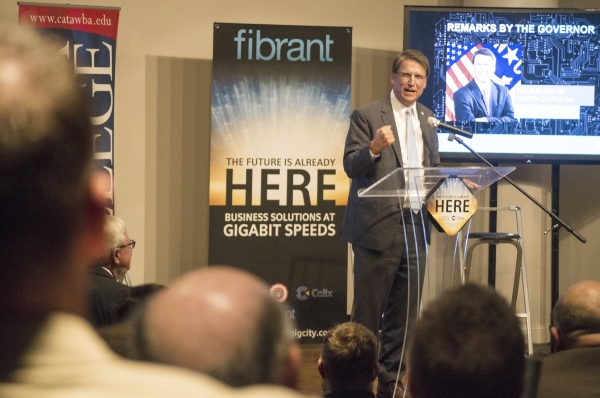David Post: City faces a million-dollar vote on the Fibrant lease
Published 12:00 am Sunday, May 6, 2018

- Then-Gov. Pat McCrory speaks during the city's 2015 announcement at Catawba College that Fibrant is able to offer 10 gigabit speeds. Salisbury voters face a referendum on leasing Fibrant to Hotwire Communications. Josh Bergeron / Salisbury Post
Should Fibrant enter a public-private partnership with Hotwire Communications?
That is the multi-million dollar vote.
The stark reality of the Fibrant vote on May 8 is this:
A No vote will cost the Salisbury taxpayer more than $40 million over the next ten years.
A Yes vote will save Salisbury $20 million over the next ten years.
Conceived more than 10 years ago, Salisbury borrowed more than $30 million to build Fibrant. The lights were “turned on” in December 2010.
A few months later, the newly elected state legislature – with a lot of help from competitor lobbyists – passed a law that guaranteed that Fibrant would lose millions and have no way out.
Since then, Fibrant has lost more than $3 million dollars each year. It has never covered its operating expenses and then had to make its bond payments. To cover some of those losses, Fibrant borrowed almost $8 million from the Water Fund. (No, your water bills have not increased because of that.)
To cover Fibrant losses, Salisbury taxpayers pay almost 12 cents extra, resulting in one of the highest property tax rates in the state.
There are pros and (a few) cons.
Pro: Salisbury currently spends almost $3.4 million to cover Fibrant. Soon, an additional $5-7 million is needed for equipment replacement and upgrades. Do the math. That’s over $40 million in ten years.
Vote Yes means Hotwire will pay Salisbury a percentage of all revenues, cover all operating costs, and pay that $5-7 million for upgraded equipment. Yes Vote eliminates the operating losses and provides money for other critical needs.
Fibrant employees are outstanding. However, Fibrant is has no backups should a key person leave. Fibrant has no futurists, those gurus who see tomorrow’s technology. Our competitors have hundreds.
Ten years ago, Fibrant predicted enormous growth in cable TV and little growth in internet and telephone. Today’s reality is that cable TV is declining as consumers use internet-based video, and landline telephones (what’s that?) are disappearing. Fibrant predictions were totally wrong. How does Fibrant understand what technology looks like a decade from now?
An experienced operator, Hotwire:
• Knows how to serve and grow large customers bases;
• Is the fastest internet provider in the country;
• Offers more and better TV options (“Replay TV” allows the user to watch already broadcast programs without setting a DVR);
• Will keep pricing the same or lower;
• Will provide low-income options;
• Provides company-based customer service (Fibrant has its own but also uses an out-of-state independent contractor);
• Has hundreds of experienced employees and backups.
Con: What happens to Fibrant employees? About 30 years ago, the Salisbury Post, with approximately 75 employees, converted from typewriters and typesetters to computers. Jimmy Hurley promised to find everyone another job, and he did. Salisbury has 450 employees. City Manager Lane Bailey is committed to finding a place for everyone, but if some cannot be redeployed, severance packages – more generous than the private sector – will be offered.
Another con. If for whatever reason Hotwire doesn’t work, putting a team back together would be extremely challenging.
Vote Yes creates a Salisbury-Hotwire public-private partnership exactly like what other municipalities are doing now. Hundreds of municipalities nationwide are spending tens of millions to build broadband infrastructure that are being operated by private sector providers. Internet infrastructure is going to cost the taxpayer something. We know the public-private partnership model well. Governments build airports and highways that airlines and vehicles pay to use with the taxpayer footing much of the cost.
The private sector only follows the money. Fibrant covers all 353 miles of Salisbury streets. The private sector has wired only “moneyed” areas of Salisbury while the county has many “digital deserts” with no service.
Salisbury has some big potholes – real and metaphorical – to refill. Vote Yes provides that opportunity. Vote No means more potholes and even higher taxes.
It’s the voters’ choice.
David Post is Salisbury’s mayor pro tem.

